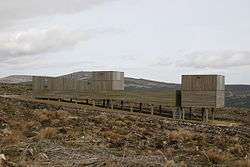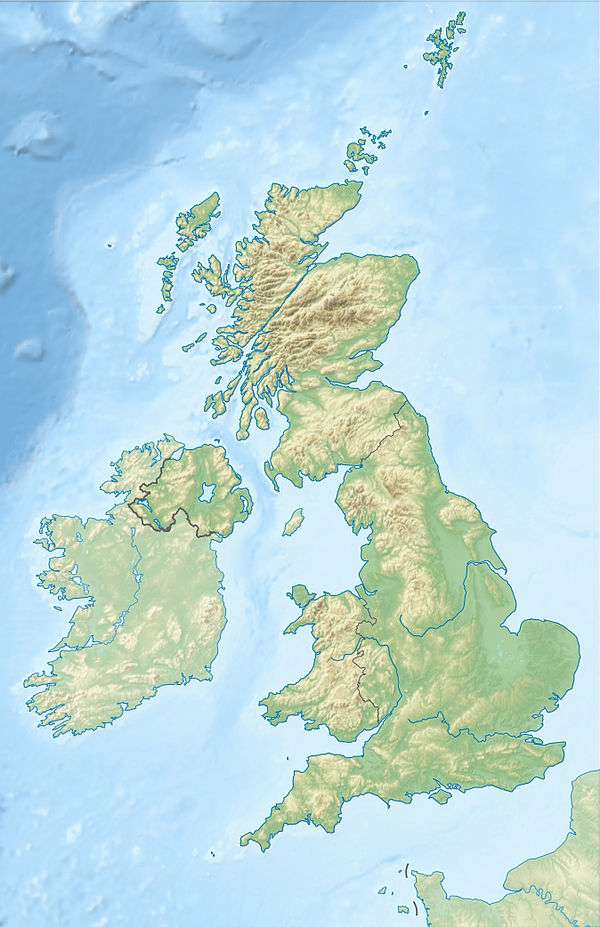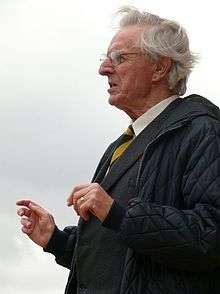Kielder Observatory
Kielder Observatory is an astronomical observatory located in Kielder Forest, Northumberland, England. It is situated high upon Black Fell overlooking Kielder Water near the Scottish border, and half a mile up a forest track from James Turrell's Kielder Skyspace. The site was chosen due to its pristine night skies in a location free of light pollution [1] with clear views to all horizons, and is one of the best places in the UK to view the Milky Way.[2]
 Kielder Observatory | |||||||||||||
| Organization | Kielder Observatory Astronomical Society | ||||||||||||
|---|---|---|---|---|---|---|---|---|---|---|---|---|---|
| Location | Kielder Forest, Northumberland, England | ||||||||||||
| Coordinates | 55°13′55″N 2°36′58.5″W | ||||||||||||
| Altitude | 370 m (1,214 ft) | ||||||||||||
| Established | 2008 | ||||||||||||
| Website | Kielder Observatory | ||||||||||||
| Telescopes | |||||||||||||
| |||||||||||||
 Location of Kielder Observatory | |||||||||||||
The observatory was officially opened on 25 April 2008 by Sir Arnold Wolfendale 14th Astronomer Royal [3] and in its first year entertained approximately 1200 guests with numbers growing "astronomically" in 2014 nearing 20,000 visitors, thus making it one of the top tourist destinations in Northumberland.
Open 7 days per week the primary function of the observatory is outreach. It plays host to numerous public events all of which are accessible to all members of the public no matter their experience or prior knowledge. Each event consists of a themed presentation, tour of the observatory and tuition on using the telescopes by experienced astronomers. Should the skies be clear visitors are encouraged to make observations using the large-aperture instruments of fascinating astronomically-distant objects such as galaxies and nebulae as well as those closer to Earth including planets, the Moon and comets—a chance for everyone to engage in the Universe around them.

The design of the observatory is in keeping with the ethos of the forest, not only in style but also being environmentally friendly—powered by solar panels and a wind turbine. This design is the result of a competition managed by RIBA Competitions which was won by London based Charles Barclay Architects.[4] It won the RIBA Award [5] for its architecture in 2009 and also that same year a Civic Trust Award.[6]
The observatory is administered by the Kielder Observatory Astronomical Society, a registered charity and comprising a board of Trustees, 10 permanent members of educational delivery staff, who deliver the event schedule, and a large group of enthusiastic volunteers all of whom help run the public events hosted at the facility.
In 2018 Kielder Observatory has expanded to accommodate construction of the Gillian Dickinson Astroimaging Academy.[7]
Kielder Observatory also runs educational outreach activities in Schools throughout the region in a co-funded project by various Local Authorities. Most recently, Kielder Observatory was awarded funding and contract for delivery in the North of Tyne Combined Authority [8] district.
Awards
- Northumberland What's On Where Award 2015 - Best Visitor Attraction
- North East Tourism Awards 2014 - Small Visitor Attraction (Silver Award)
- Visit England Gold Award 2013 - Kielder Water Forest Park
2015 - Gold winner; North east tourism awards; Best small visitor attraction
External links
| Wikimedia Commons has media related to Kielder Observatory. |
References
- "Observatory boasts darkest skies". BBC Online. 25 April 2008. Retrieved 29 December 2012.
- Henderson, Tony (18 February 2012). "Kielder named top place to view the Milky Way". The Journal. Retrieved 29 December 2012.
- "From Big Bang to the night sky in winter..." Hexham Courant. 10 October 2008. Archived from the original on 20 April 2013. Retrieved 29 December 2012.
- "Kielder Observatory History". Archived from the original on 2014-11-02. Retrieved 2015-04-14.
- "RIBA award". Retrieved 2015-04-14.
- "Kielder Observatory scoops major award". News Post Leader. 23 March 2009. Retrieved 29 December 2012.
- Gillian Dickinson Astroimaging Academy
- North of Tyne Combined Authority